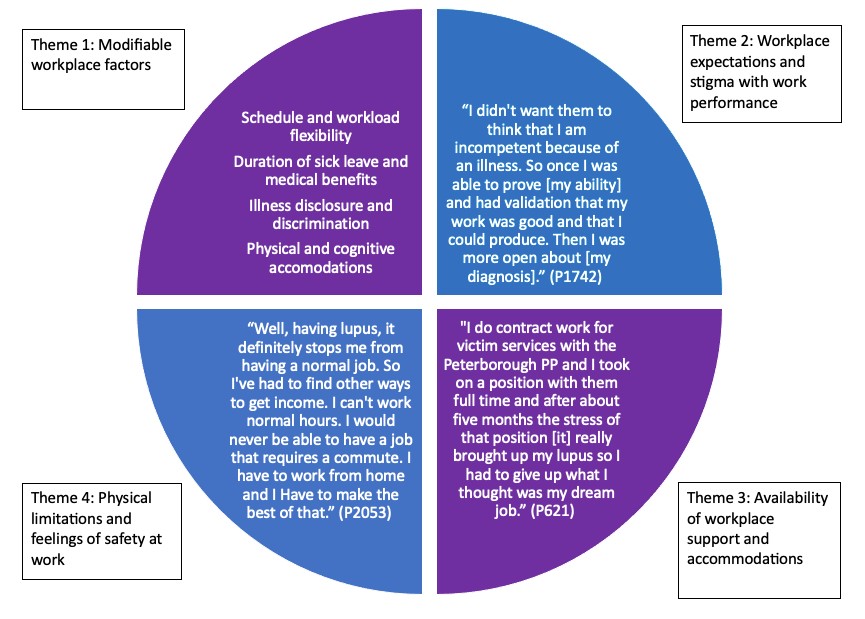Session Information
Date: Tuesday, November 14, 2023
Title: (2257–2325) SLE – Diagnosis, Manifestations, & Outcomes Poster III
Session Type: Poster Session C
Session Time: 9:00AM-11:00AM
Background/Purpose: Work participation meaningfully influences mental wellbeing, health-related quality of life, and disease-related outcomes in individuals with systematic lupus erythematosus (SLE). Previous studies estimate that 20-50% of SLE patients experience some form of work disability (WD) yet there is limited understanding of the integrative effects of the psychosocial and workplace factors associated with WD. The objective of this study was to identify psychosocial and workplace factors associated with WD to create an SLE-related functional profile that is grounded in a WD prevention framework.
Methods: SLE patients (n=28) were purposively recruited from multiple medical centers across Canada. Guided by the WD prevention framework, semi-structured interviews were conducted with patients to explore their perspectives of factors associated with WD. The guide contained questions corresponding to the framework’s proposition that disability in the workplace is not only due to the workers’ characteristics but also due to environmental factors. Interview data were transcribed verbatim. Thematic analysis was utilized to analyze the data.
Results: Four themes emerged from the data: a) modifiable workplace factors, b) workplace expectations and stigma with work performance, c) availability of workplace support and accommodations, d) physical limitations and feelings of safety at work (Figure 1). Neurocognitive symptoms, fatigue, and physical limitations were frequently reported as factors associated with WD in SLE. Participants reported that participation in work increased their personal control, and reduced their physical and mental demands were more desirable and which in turn, subjectively prevented WD (Figure 2).
Conclusion: WD in SLE necessitates the recognition of the dynamic symptom fluctuations and multidimensionality of the disease, in the context of its relationship to work. Future studies should examine the psychosocial and workplace factors identified to establish a goal-oriented preventative framework that could improve WD outcomes in individuals with SLE.
To cite this abstract in AMA style:
Howe A, Li A, Jules K, Tan J, Sadek M, Kakvan M, Chattu V, Bani-Fatemi A, Bonilla D, Nielsen W, Anderson N, Avina-Zubieta J, Fox M, Shaw W, Haaland D, Pope J, Fortin P, Bingham K, Rozenbojm N, Peschken C, Su J, Reynolds J, Ivory C, Gladman D, Urowitz M, Sanchez-Guerrero F, Lim L, Keeling S, Soberanis A, Katz P, Touma Z, Nowrouzi-Kia B. Systemic Lupus Erythematosus and Functional Work Disability: A Qualitative Perspective Using a Work Disability Prevention Approach [abstract]. Arthritis Rheumatol. 2023; 75 (suppl 9). https://acrabstracts.org/abstract/systemic-lupus-erythematosus-and-functional-work-disability-a-qualitative-perspective-using-a-work-disability-prevention-approach/. Accessed .« Back to ACR Convergence 2023
ACR Meeting Abstracts - https://acrabstracts.org/abstract/systemic-lupus-erythematosus-and-functional-work-disability-a-qualitative-perspective-using-a-work-disability-prevention-approach/


